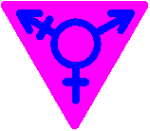 Most efforts to protect transgender workers
have focused on transsexuals. Transsexuals must either change jobs
or visibly transition in the workplace, so they have the most on the line.
Most efforts to protect transgender workers
have focused on transsexuals. Transsexuals must either change jobs
or visibly transition in the workplace, so they have the most on the line.
These externally visible masculine or feminine traits are called gender expression A person born male who doesn't fit the cultural stereotype of what a man should act like (e.g. Rambo) or a person born female who doesn't fit our society's ideal female image (e.g. Barbie) suffers discrimination in our society. These gender variant people might be heterosexual, homosexual, or bisexual - it doesn't matter, because it's not their love life that leads to discrimination, it's their gender expression. (Incidently, society also expects Barbie and Rambo to marry and have children. Gays and lesbians who look straight violate this expectation, and can be considered gender variant.)
Transgender people are also gender variant. Their gender expression isn't close to Barbie or Rambo. While many transsexuals born female emulate Rambo and many born male strive to be Barbie, they aren't any more successful than the rest of the world!
It's not well known that a policy or law protecting sexual orientation does not protect gender expression. A gay man who comes across as a queen can be fired for his gender expression, even in a state or company that protects sexual orientation. Courts have also held that laws prohibiting sex discrimination do not protect the gender variant.
Surveys have been taken among gay, lesbian, and bisexual people, asking if they have been discriminated against due to their gender expression. (The surveys were careful to exclude discrimination due to sexual orientation.) One survey at Creating Change (a national GLBT activist conference) found that 37% of GLB people had suffered from gender discrimination. Another survey (at a Pride celebration) found that 76% of GLB people reported such discrimination.
A good policy prohibits discrimination due to irrelevant issues. A policy that protects sexual orientation and gender identity will prevent firing someone because of who they love, or because they are transsexual. A policy that protects gender expression will protect anyone whose looks, clothing, or behavior is gender variant, including crossdressers, feminine gay men, masculine lesbian women, even masculine straight women and feminine straight men!
Depending upon the definition, a policy protecting gender expression may not protect transsexuals. It might be possible to argue that, for example, a butch woman is protected by gender expression. But what if she goes further and changes sex? If she (now he) is transsexual and acquires a new name, pronouns, and restroom, his case is about gender identity.
Transgender at Work recommends including both gender identity and gender expression in nondiscrimination policies. (We also recommend including gender characteristics, to protect intersexuals.)